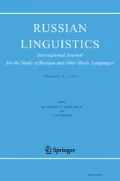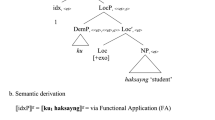Abstract
The aim of this paper is to describe the main clause of a type of concessive construction usually referred to as a universal concessive conditional. The main clause of a Russian universal concessive conditional typically contains a strong or even irrefutable statement, which goes against the expectations of the hearer. In the literature it has been attested that the main clause of this construction typically contains contrastive markers, such as vse-taki ‘nevertheless’, and universal quantifiers (e.g. vsegda ‘always’, nikogda ‘never’). Our data show that these two markers are only found in a minority of cases. Since counter-expectation and contrast are the central elements of the construction, we may expect other operators that are related to the notion of polarity to be found in the main clause, such as aspectual markers (e.g. ešče ‘still’), modal operators (e.g. dolžen ‘must’), focus particles (e.g. tol’ko ‘only’), comparative quantifiers (e.g. bol’še ‘more’), or negation. We will describe the use of these elements based on a synchronic corpus study and account for their contribution to the meaning of the construction as a whole and to the pragmatic function of the universal concessive conditional construction.
Аннотация
В данной статье предлагается описание главного предложения, выражающего обобщенно-уступительныe отношения в русском языке. В русском языке в главном предложении, выражающем обобщенно-уступительные отношения, обычно дается весомая или даже неопровержимая информация, которая противоречит ожиданиям реципиента. В научной литературе большое внимание уделяется языковым единицам, подчеркивающим противопоставление (напр. все-таки) и универсальным кванторам (напр. всегда, никогда). Из нашего исследования, однако, следует, что эти два оператора встречаются не так часто. Исходя из того, что противоречие между информацией и ожиданием реципиента и противопоставление являются центральными элементами семантики таких конструкций, можно предположить, что в главном предложении присутствуют и другие полярные операторы: аспектуальные операторы (напр. еще), модальные операторы (напр. должен), фокусные частицы (напр. только), сравнительные кванторы (напр. больше) и отрицание. Основываясь на анализе синхронного корпуса, мы рассматриваем употребление этих элементов и объясняем их влияние на прагматическую функцию обобщенно-уступительной конструкции и на значение всей конструкции.
Similar content being viewed by others
Notes
Unless indicated differently, all examples were taken from the Russian National Corpus (RNC: www.ruscorpora.ru). The following abbreviations have been used: asp—aspectual marker, comp—comparative quantifier, contr—contrastive marker, ellips—ellipsis, foc—focus, mod—modal operator, neg—negation, part—particle ni, uneg—negative universal quantifier, upos—positive universal quantifier, wh—interrogative pronoun. The semantic operators in the main clause were indicated in superscript. In the translations to the examples, the corresponding elements were italicized.
Our corpus of UCC constructions was created from a larger corpus that was initially gathered to describe the use of particle ni in Russian. For that purpose, the particle ni was sought for in 1,000 documents from the period 2000–2004 of the RNC reference corpus, which resulted in a total of 4,417 utterances with particle ni. We then manually filtered out the constructions with a wh-item and particle ni in the subclause, and ended up with 665 UCC constructions.
The issue of multiple anchoring will be discussed in Sect. 5.
An anonymous reviewer pointed at the fact that in example (17), the UCC construction consists of two sentences, rather than of one complex sentence. For the aims of our research project, we included in our data both prototypical UCC constructions, and non-prototypical constructions, such as kak by to ni bylo and kak ni stranno. The latter have lost their lexical variability and underwent semantic bleaching. Moreover their scope changed: the UCC constructions mentioned above do not function on a sentential level, but rather on the speech act or discourse level.
As an anonymous reviewer points out, it may not be so obvious to link example (18) to the semantics of the UCC construction, more specifically to its concessive nature. We argue that in this sentence the speaker assumes that the hearer does not expect one and the same play to be on in the same theatre every time one passes by.
References
Fortuin, E. (2000). Polysemy or monosemy: interpretation of the imperative and the dative-infinitive construction in Russian. Ph.D. dissertation. Amsterdam.
Haspelmath, M., & König, E. (1998). Concessive conditionals in the languages of Europe. In J. v. d. Auwera & D. P. Ó. Baoill (Eds.), Adverbial constructions in the languages of Europe (Empirical Approaches to Language Typology, 20. EUROTYP, 3) (pp. 563–640). Berlin, New York.
Petrovskaja, N. V. (2004). Ustupitel’nye otnošenija. In A. V. Veličko (Ed.), Kniga o grammatike: russkij jazyk kak inostrannyj (pp. 311–323). Moskva.
Švedova, N. (Ed.) (1980). Russkaja grammatika. Tom 2. Moskva.
Xrakovskij, V. S. (1999). Universal’nye ustupitel’nye konstrukcii. Voprosy jazykoznanija, 1, 103–122.
Author information
Authors and Affiliations
Corresponding author
Additional information
I gratefully acknowledge the valuable information and helpful comments by Hans Smessaert.
Rights and permissions
About this article
Cite this article
Van de Cruys, K. Focus on the irrefutable. A closer look at the main clause of the Russian universal concessive conditional. Russ Linguist 37, 61–69 (2013). https://doi.org/10.1007/s11185-012-9106-2
Published:
Issue Date:
DOI: https://doi.org/10.1007/s11185-012-9106-2




